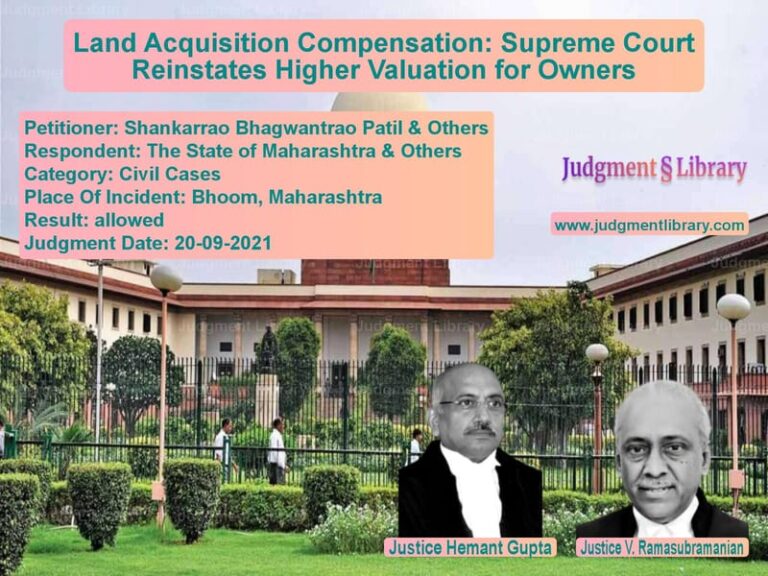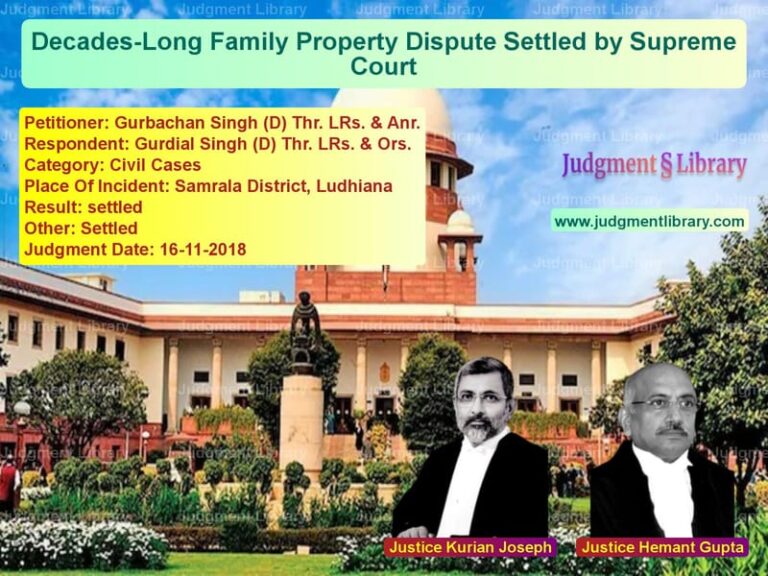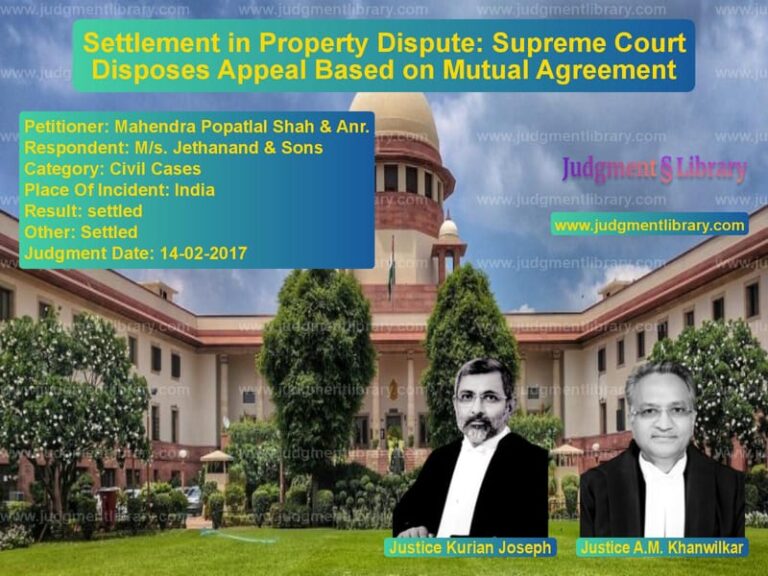Supreme Court Upholds Eviction Decree Based on Tenant’s Admission Under West Bengal Premises Tenancy Act
The Supreme Court of India recently delivered a judgment in the case of Rajiv Ghosh vs. Satya Narayan Jaiswal, which revolved around the eviction of a tenant under the West Bengal Premises Tenancy Act, 1997. The case highlighted the legal nuances of inherited tenancy rights and the application of Order XII Rule 6 of the Civil Procedure Code (CPC) for judgments based on admissions. Here’s a detailed breakdown of the case and the Court’s reasoning.
Background of the Case
The dispute arose when the respondent, Satya Narayan Jaiswal (the landlord), filed a title suit for eviction and mesne profits against the petitioner, Rajiv Ghosh (the tenant). The petitioner was the son of the original tenant, Late Ranjan Ghosh, who had passed away on 13.07.2016. The landlord argued that the petitioner’s tenancy rights, as per Section 2(g) of the West Bengal Premises Tenancy Act, 1997, were limited to five years from the date of his father’s death. The trial court decreed the suit based on admissions made by the petitioner in his written statement, and the High Court upheld this decision. The petitioner then approached the Supreme Court.
Key Arguments
Petitioner’s (Rajiv Ghosh) Arguments
- The petitioner contended that the trial court erred in passing a decree under Order XII Rule 6 of the CPC, as there was no clear admission in his written statement.
- He argued that the provisions of the West Bengal Premises Tenancy Act, 1997, were not applicable to his case, and thus, his tenancy rights should not be limited to five years.
- The petitioner claimed that he had filed an application under Sections 7(1) and 7(2) of the Act for payment of rent, which indicated his continued tenancy rights.
Respondent’s (Satya Narayan Jaiswal) Arguments
- The respondent argued that the petitioner’s tenancy rights, as the son of the original tenant, were limited to five years from the date of his father’s death, as per Section 2(g) of the Act.
- He highlighted that the petitioner had admitted in his written statement that the original tenant was his father and that rent was paid till May 2021, which was beyond the five-year limit.
- The respondent emphasized that the trial court rightly decreed the suit under Order XII Rule 6 of the CPC, as the admissions in the written statement were clear and unequivocal.
Court’s Observations and Decision
The Supreme Court, in its judgment authored by Justices J.B. Pardiwala and R. Mahadevan, made the following key observations:
Applicability of Section 2(g) of the West Bengal Premises Tenancy Act, 1997
The Court noted that Section 2(g) of the Act explicitly limits the tenancy rights of dependent heirs (other than the widow) to five years from the date of the original tenant’s death. The Court observed:
“Thus, the plain reading of Section 2(g) referred to above would indicate that the dependent heir of the original tenant unless she is the widow of the original tenant would be entitled to carry on as a tenant [coming within the definition of ‘tenant’ as defined under Section 2(g)] in such capacity for a period of 5 years from the demise of the original tenant.”
The Court found that the petitioner, being the son of the original tenant, could not claim tenancy rights beyond the five-year period stipulated under the Act.
Judgment Based on Admissions Under Order XII Rule 6 of the CPC
The Court examined whether the trial court was justified in passing a decree under Order XII Rule 6 of the CPC based on the petitioner’s admissions in his written statement. The Court referred to the legislative intent behind Order XII Rule 6, stating:
“The object of the rule is to enable a party to obtain speedy judgment, at least to the extent of the relief to which, according to the admission of the defendant, the plaintiff is entitled.”
The Court emphasized that the petitioner’s admissions in his written statement were clear and unambiguous, making it appropriate for the trial court to decree the suit under Order XII Rule 6. The Court also noted that the petitioner’s attempt to argue the inapplicability of the Act was an afterthought, as he had previously filed an application under Sections 7(1) and 7(2) of the Act, acknowledging its applicability.
Discretionary Power of the Court Under Order XII Rule 6
The Court clarified that the power to pass a judgment based on admissions under Order XII Rule 6 is discretionary and not mandatory. The Court observed:
“The provisions of Rule 6 are enabling, discretionary and permissive. They are not mandatory, obligatory or peremptory. This is also clear from the use of the word ‘may’ in the rule.”
The Court upheld the trial court’s exercise of discretion in passing the decree, as the admissions in the written statement were sufficient to establish the landlord’s right to eviction.
Final Decision
The Supreme Court dismissed the petitioner’s special leave petition, affirming the decisions of the trial court and the High Court. The Court held:
“We are of the view having regard to the clear and unequivocal admission made by the defendant in his written statement, the High Court committed no error much less any error of law in decreeing the suit applying Order XII Rule 6 of the CPC.”
Conclusion
This judgment underscores the importance of clear admissions in pleadings and the discretionary power of courts to pass judgments based on such admissions under Order XII Rule 6 of the CPC. It also reaffirms the limited tenancy rights of dependent heirs under the West Bengal Premises Tenancy Act, 1997, providing clarity on the interpretation of Section 2(g) of the Act.
Petitioner Name: Rajiv Ghosh.Respondent Name: Satya Narayan Jaiswal.Judgment By: Justice J.B. Pardiwala, Justice R. Mahadevan.Place Of Incident: Calcutta, West Bengal.Judgment Date: 07-04-2025.Result: dismissed.
Don’t miss out on the full details! Download the complete judgment in PDF format below and gain valuable insights instantly!
Download Judgment: rajiv-ghosh-vs-satya-narayan-jaiswa-supreme-court-of-india-judgment-dated-07-04-2025.pdf
Directly Download Judgment: Directly download this Judgment
See all petitions in Property Disputes
See all petitions in Landlord-Tenant Disputes
See all petitions in Judgment by J.B. Pardiwala
See all petitions in Judgment by R. Mahadevan
See all petitions in dismissed
See all petitions in supreme court of India judgments April 2025
See all petitions in 2025 judgments
See all posts in Civil Cases Category
See all allowed petitions in Civil Cases Category
See all Dismissed petitions in Civil Cases Category
See all partially allowed petitions in Civil Cases Category







